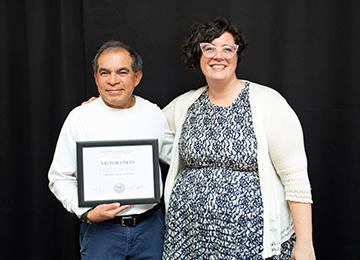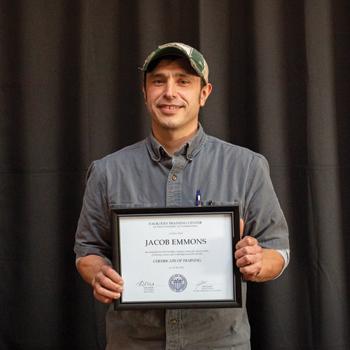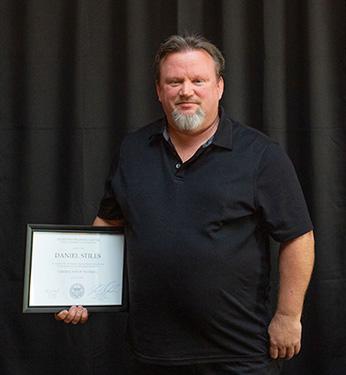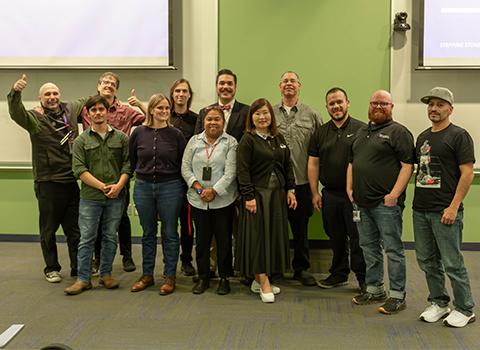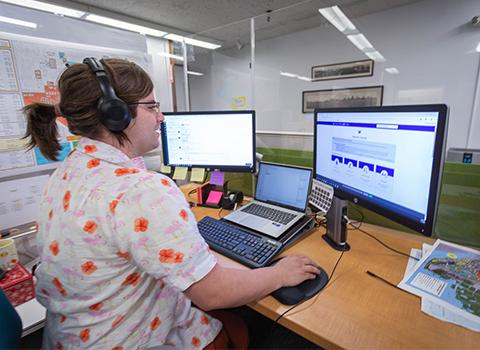Leadership lessons with Stepping Stones
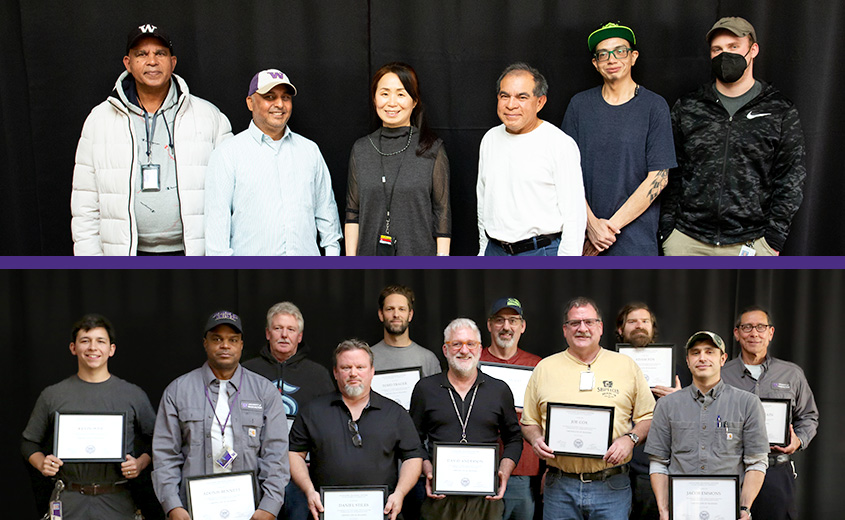
Top (left to right): Rezene Mebrahtu, Gopal Narayanan, Eun Hee Han, Victor Osejo, Robert Bale and Mike Westerberg. Not pictured: Nate Whittaker and Habte Tesema. Bottom (left to right): Kevin Wise, Adonis Bennett, Kelly Murtha, Daniel Stiles, Todd Tracer, David Anderson, Eric Broekhuizen, Joe Cox, Adam Fox, Jacob Emmons and Michael Crain. Not pictured: Albert Mendoza.
At the Nov. 16 graduation ceremony for Stepping Stones to Success, UW Facilities’ leadership development program for front-line staff, instructor Sarah Lewis-Assink joked, “The word ‘empathy’ has been used 14,546 times in this program.”
Empathy was a key concept for the day's graduates, all members of UW Facilities’ Maintenance & Construction and Campus Energy, Utilities & Operations departments — and it wasn’t one many of them thought much about before.
“It's really hard to teach guys like us who have been in the business for 40 years now,” said Daniel Stiles, an operating engineer lead at the UW Power Plant. “I think what Sarah teaches us is how to bring our own skills that we've blocked up for so long. … I've been a better person the last nine months.”
Stepping Stones, a program offered by UW Facilities’ Partner Resources team, goes from March to November and is taught by Lewis-Assink, with help from Liz Pentilla. It teaches professional, personal and practical leadership skills — from broad leadership concepts like empathy to specific information related to being a leader in the department. There are two cohorts: the one from M&C and CEUO, 12 of whom graduated on Nov. 16, and another from the Building Services Department, eight of whom graduated at a separate ceremony on Oct. 26.
Along with leadership skills, graduates get six months of supervisory credit from UW Human Resources, which helps them reach minimum eligibility for supervisory roles.
UW Facilities began offering Stepping Stones in 2015. It has gone through transitions with new trainers coming aboard and, as a result of COVID, first a pause in 2020 and then a move online in 2021.
This year, with the program in-person for the first time in two years, participants — many of whom rarely interact with people outside their shop or area — were able to get to know each other and gel as a group, meeting for two hours once a week. In the first phase of the program, they learned personal leadership skills, like goal setting and working with managers, sometimes exploring their own personal triggers that cause emotions to surface.
During this section, the content of the course is tailored to fit the needs of the group. While empathy was emphasized for the M&C/CEUO cohort, conflict resolution was one of the key takeaways for the Building Services Department participants.
Victor Osejo, a custodian in Area C, says that before Stepping Stones, if someone accused him of making a mistake, he would’ve become defensive. Now he says that, if faced with the same situation, he’d work with his manager to redo the work.
“The class made me more responsible,” he said. “If someone needs help, I’m more than willing to help out now.”
After the first phase focusing on leadership skills, the course teaches practical skills related to being a leader in UW Facilities. For 12 to 16 weeks, subject matter experts on topics like Workday, safety, recycling and more come each week to share what leaders need to know. Staff are then matched with a series of managers for eight days of job shadowing in different areas of the department.
In the final phase of Stepping Stones, participants put the skills they’ve learned into practice. They work on their resumes, do mock interviews, and complete and present a capstone project to their cohort. Capstone projects for this year’s graduates included helping to train new hires, taking on supply ordering for an area, managing the refinishing of a floor and coordinating the installation of a lift at the IMA.
In the end, graduates leave with a better picture of what it means to be a leader at UW Facilities. This includes greater awareness about the different factors that go into decision-making and management — and deeper understanding of leadership, whether you have the title or not.
“I don't think that leadership is positional; I think it's behavioral,” said Lewis-Assink. “And so we really teach that it doesn't matter what role you are in, you can be a leader. And what do leaders look like? They look like people who care for other people.”
Metal tradesman Jacob Emmons started Stepping Stones because he wanted to learn more about how the department worked. He wasn’t trying to move up.
“I just liked the status quo where I'm at, and I didn’t see myself pursuing that avenue — the competition or whatever,” said Emmons, who wrote profiles of his colleagues as his capstone project. “I didn't have confidence either. I couldn't envision myself being in that position because I wasn't quite sure of what the role required.
“But I learned what they were asking of us, which was not to be necessarily completely adept at the trade skill but in being adept at interacting with people. So that opened my eyes a lot.”
Emmons now says he is more comfortable with the idea of applying for leadership positions.
And he’s not alone in seeing himself more as a leader after completing Stepping Stones. Participants took a survey assessing their own leadership skills before and after completing the program. They rated themselves higher at program’s end, with improvement in skills like “When customers have concerns or complaints, I am able to address their needs in a sympathetic and customer-focused way” and “I feel confident that I would make a good supervisor or manager one day.”
Stiles, the Power Plant lead, is taking the skills he learned at Stepping Stones home with him.
“At the beginning of the class, if I got anything out of it, I was hoping it would help my relationship with my fiancée, and it has,” he said. “It is going to work at home. That's where the empathy will come in.”
And a happy home life will affect work life too.
“It’ll carry into your job if you’re not moody when you wake up.”
